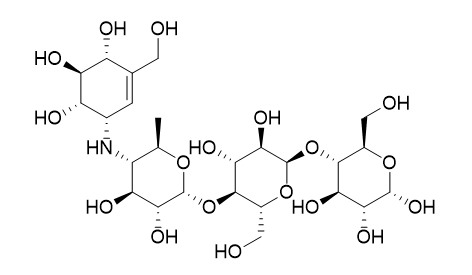Acarbose
Acarbose is an alpha-glucosidase inhibitor that treats PPH by slowing gastric transit time and reducing glucose uptake in the small intestine, hence decreasing superior mesenteric artery blood flow. Acarbose improves the glycemic profile and insulin sensitivity in elderly patients with type 2 diabetes who are inadequately controlled on diet alone.
Inquire / Order:
manager@chemfaces.com
Technical Inquiries:
service@chemfaces.com
Tel:
+86-27-84237783
Fax:
+86-27-84254680
Address:
1 Building, No. 83, CheCheng Rd., Wuhan Economic and Technological Development Zone, Wuhan, Hubei 430056, PRC
Providing storage is as stated on the product vial and the vial is kept tightly sealed, the product can be stored for up to
24 months(2-8C).
Wherever possible, you should prepare and use solutions on the same day. However, if you need to make up stock solutions in advance, we recommend that you store the solution as aliquots in tightly sealed vials at -20C. Generally, these will be useable for up to two weeks. Before use, and prior to opening the vial we recommend that you allow your product to equilibrate to room temperature for at least 1 hour.
Need more advice on solubility, usage and handling? Please email to: service@chemfaces.com
The packaging of the product may have turned upside down during transportation, resulting in the natural compounds adhering to the neck or cap of the vial. take the vial out of its packaging and gently shake to let the compounds fall to the bottom of the vial. for liquid products, centrifuge at 200-500 RPM to gather the liquid at the bottom of the vial. try to avoid loss or contamination during handling.
Current Topics in Nutraceutical Research2021, 19(1),p90-105.
Ulm University Medical Center2020, doi: 10.18725.
Molecules.2020, 25(7):1625.
Natural Product Sciences2024, 30(4):254-261.
Nat Commun.2019, 10(1):2745
Molecules.2024, 29(21):5161.
The Journal of Supercritical Fluids2021, 176:105305.
Int J Mol Sci.2022, 23(20):12516.
Drug Chem Toxicol.2020, 1-14.
Molecules.2021, 26(16):4722.
Related and Featured Products
Spinal Cord Ser Cases. 2019 Aug 30;5:75.
A case of postprandial hypotension in an individual with cervical spinal cord injury: treatment with acarbose.[Pubmed:
31632733 ]
Postprandial hypotension (PPH) is a postmeal drop in systolic blood pressure that may or may not be symptomatic. While the etiologies of PPH are incompletely understood, it is thought to occur when glucose absorption causes increased splanchnic blood flow or "pooling" in people who lack sufficient compensatory responses to support their systemic blood pressure. Postprandial hypotension is well described in individuals with neurodegenerative diseases, yet only rarely in people living with spinal cord injury (SCI). Acarbose is an alpha-glucosidase inhibitor that treats PPH by slowing gastric transit time and reducing glucose uptake in the small intestine, hence decreasing superior mesenteric artery blood flow.
METHODS AND RESULTS:
A 62-year-old woman with long-standing cervical SCI presented with 5 years of worsening postprandial lightheadedness, visual "flashes", and neck pain. She had had multiple episodes of near and frank syncope and her prior medical team had initiated midodrine three times daily. We began treatment with Acarbose, starting at 50 mg with each meal and rapidly titrating to 100 mg at mealtime. She noticed an immediate improvement in her symptoms and an attenuation of postmeal drops in both systolic and diastolic blood pressures.
CONCLUSIONS:
To our knowledge, this is one of the first described cases of PPH among people living with SCI. Given the autonomic dysfunction that frequently accompanies higher-level of injuries, it is possible that many more people with SCI have this condition, whether or not it is symptomatic. Acarbose is one of the several established treatments for PPH, and proved effective and tolerable for our patient.
Diabetes Res Clin Pract. 2003 Jan;59(1):37-42.
Acarbose in the treatment of elderly patients with type 2 diabetes.[Pubmed:
12482640 ]
To study the effect of Acarbose, an alpha-glucosidase inhibitor, on glycemic control in elderly patients with type 2 diabetes.
METHODS AND RESULTS:
Elderly patients with type 2 diabetes treated with diet alone were randomly treated in a double-blind fashion with placebo (n=99) or Acarbose (n=93) for 12 months.
After 12 months of therapy, there was a statistically significant difference in the change in glycated haemoglobin (HbA(1c)) (-0.6%) in the Acarbose group versus placebo, as well as in the incremental post-prandial glucose values (-2.1 mmol h/l) and mean fasting plasma glucose (-0.7 mmol/l). Although there was no effect of Acarbose on insulin release, there was a clear effect of Acarbose to decrease relative insulin resistance (-0.8) (HOMA method). In addition, Acarbose was generally well tolerated and safe in the elderly; most discontinuations were due to gastrointestinal side effects such as flatulence and diarrhea. There were no cases of hypoglycemia reported, and no clinically relevant changes in laboratory abnormalities or vital signs during the study.
CONCLUSIONS:
Acarbose improves the glycemic profile and insulin sensitivity in elderly patients with type 2 diabetes who are inadequately controlled on diet alone.



